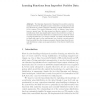Free Online Productivity Tools
i2Speak
i2Symbol
i2OCR
iTex2Img
iWeb2Print
iWeb2Shot
i2Type
iPdf2Split
iPdf2Merge
i2Bopomofo
i2Arabic
i2Style
i2Image
i2PDF
iLatex2Rtf
Sci2ools
108
click to vote
ILP
2001
Springer
2001
Springer
Learning Functions from Imperfect Positive Data
The Bayesian framework of learning from positive noise-free examples derived by Muggleton [12] is extended to learning functional hypotheses from positive examples containing normally distributed noise in the outputs. The method subsumes a type of distance based learning as a special case. We also present an effective method of outlieridentification which may significantly improve the predictive accuracy of the final multi-clause hypothesis if it is constructed by a clause-by-clause covering algorithm as e.g. in Progol or Aleph. Our method is implemented in Aleph and tested on two experiments, one of which concerns numeric functions while the other treats non-numeric discrete data where the normal distribution is taken as an approximation of the discrete distribution of noise.
Automated Reasoning | ILP 2001 | Positive Examples | Positive Noise-free Examples | Treats Non-numeric Discrete |
Related Content
| Added | 30 Jul 2010 |
| Updated | 30 Jul 2010 |
| Type | Conference |
| Year | 2001 |
| Where | ILP |
| Authors | Filip Zelezný |
Comments (0)

